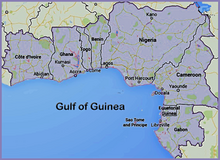User:PresidentistVB/sandbox
John Punch | |
|---|---|
| Born | |
| Died | York County in the Colony of Virginia.[1] |


John Punch ("living 1640, York County, Virginia"), with ancestral links to western Africa,[3] was a servant who lived in the Colony of Virginia during the seventeenth century. In July 1640, the Virginia Governor's Council sentenced two of his fellow servants (one of them Dutch; the other, Scottish), with extensions to their existing indentures for running away to Maryland. By stark contrast, Punch, who ran away with them, was sentenced to a lifetime of servitude, officiating his total loss of any opportunity for freedom. It is for this very reason that some historians consider him the first court-ordered slave in the Colony, and his case, an early foothold for the insidious and pervasive institution of slavery, which would be legalized in Virginia and other colonies, evolve (and devolve) with the growing nation; and, ultimately, become the single most divisive factor of the American Civil War.[4][5][6]
In July 2012, Ancestry.com issued a press release and stated "President Obama descends from the first African enslaved for life in America," publishing two papers [1][2], which suggested that, based on historical research, genealogical proofing and scientific analyses, Punch was his inevitable eleventh great-grandfather.[7][8][9] Punch, whose descendants are believed to have become known by the "Bunch" or "Bunche" surname,[10] is also believed to be one of the ancestors of the 20th-Century American diplomat Ralphe Bunche,[ibid] the first African American(?) to win the Nobel Peace Prize.[11]
Dr. Matt (talk) 16:32, 24 May 2014 (UTC)
For a detailed cause and effect description of differences between main page lead and this proposed template, please visit the Punch talk page beginning with the section entitled, "The First Paragraph." Dr. Matt (talk) 17:17, 24 May 2014 (UTC)
Dr. Matt (talk) 17:37, 24 May 2014 (UTC)
Dr. Matt (talk) 17:38, 24 May 2014 (UTC) Subsequent edits 1: Dr. Matt (talk) 05:27, 26 May 2014 (UTC)
- ^ a b Anastasia Harman, Natalie D. Cottrill, Paul C. Reed, and Joseph Shumway (2012). "Documenting President Barack Obama’s maternal African-American ancestry: tracing his mother’s Bunch ancestry to the first slave in America", Ancestry.com, 16 July 2012.
- ^ Maps, Google®. "The Gulf of Guinea Nations". Google®.
{{cite web}}:|first=has generic name (help) - ^ Harman, Anastasia; et al. "Documenting President Barack Obama's Maternal African - American Ancestry: Tracing His Mother's Bunch Ancestry to the First Slave in America" (PDF). Ancestry.com.
{{cite web}}: Explicit use of et al. in:|last=(help) - ^ John Donoghue (2010). "'Out of the Land of Bondage': The English Revolution and the Atlantic Origins of Abolition". The American Historical Review. 115 (4).
- ^ Tom Costa (2011). "Runaway Slaves and Servants in Colonial Virginia". Encyclopedia Virginia.
- ^ Paul Finkelman (1985). Slavery in the Courtroom: An Annotated Bibliography of American Cases (Library of Congress). p. 3
- ^ "Ancestry.com Discovers President Obama Related to First Documented Slave in America", Ancestry.com. July 30, 2012.
- ^ Stolberg, Sheryl Gay "Obama Has Ties to Slavery Not by His Father but His Mother, Research Suggests", The New York Times. July 30, 2012.
- ^ Plante, Bill "Surprising link found in Obama's family tree", CBS News. July 30, 2012.
- ^ Harman, Anastasia; et al. "Documenting President Barack Obama's Maternal African - American Ancestry: Tracing His Mother's Bunch Ancestry to the First Slave in America" (PDF). Ancestry.com.
{{cite web}}: Explicit use of et al. in:|last=(help) - ^ Paul Heinegg, Free African Americans in Virginia, North Carolina, South Carolina, Maryland and Delaware, 1995-2000.

